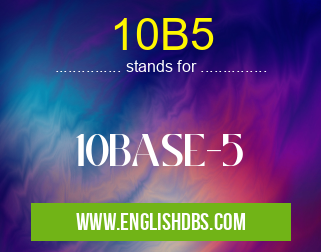What does 10B5 mean in COMPUTING
10B5 stands for 10BASE-5, which is a network protocol that was created by the IEEE (Institute of Electrical and Electronics Engineers) in the early 1990s. It provided a way for computers to communicate with each other across long distances using Ethernet cabling. 10BASE-5, sometimes referred to as “Thick Ethernet” or “Thicknet” because of the thick coaxial cable used, was one of the first standards for local area networks (LANs).

10B5 meaning in Computing in Computing
10B5 mostly used in an acronym Computing in Category Computing that means 10BASE-5
Shorthand: 10B5,
Full Form: 10BASE-5
For more information of "10BASE-5", see the section below.
Advantages and Disadvantages
The primary advantage of 10BASE-5 is its high speed compared to other networking technologies available at the time, such as Token Ring or ARCNET. It also had an impressive maximum distance range of 500 meters and reliable resistance against electrical interference from nearby power lines or radios. Its inherent robustness made it ideal for corporate settings where reliability was essential but complex installation requirements were not feasible due to time constraints or budgetary limits. However, these advantages came at a cost – literally – as the thick coaxial cables used with this protocol are much more expensive than more contemporary alternatives such as twisted pair wiring. Additionally, its signaling method (baseband) means that it can only transmit one signal at a time down its wire, so it cannot support multiple simultaneous transmissions like some modern protocols do.
Essential Questions and Answers on 10BASE-5 in "COMPUTING»COMPUTING"
What is 10BASE-5?
10BASE-5, also known as Ethernet, is a physical data transmission technology used in Local Area Networks (LANs). It is widely used in today’s computer networks for file transfers and other data transmissions. 10BASE-5 uses coaxial cables as media to transfer data at a rate of up to 10 Mbps (million bits per second).
What type of cable is used for 10BASE-5?
10BASE-5 utilizes thick coaxial cables for transmission of data. This type of cable comes with a conductor shielded by an insulation layer, which allows it to protect sensitive network signals from being susceptible to external interference.
How does 10BASE-5 work?
In a 10BASE-5 connection, each computer is connected via a single segment of coaxial cable that provides the necessary physical medium for transmitting data packets between all connected devices in the network. Each device has its own network interface card (NIC) connecting it to the other endpoints on the same segment. Data packets transmitted over this connection are broadcasted through all connected devices so that each endpoint can receive and transmit data simultaneously.
What is the speed of 10BASE-5 connections?
The maximum speed of a typical 10BASE-5 Ethernet connection ranges from 2 to 10 megabits per second (Mbps). Depending on the traffic on your network, and depending on the length of your cabling segments, you may get higher or lower speeds than this.
Is there any advantage of using a 10BASE-5 connection?
One major advantage of using a 10BASE-5 connection is its high reliability and security since they are not affected by external noise created by electromagnetic radiation or other electrical sources that can interfere with wireless radio signals or wired twisted pair solutions. Additionally, since most corporate networks use coaxial cabling they can easily be upgraded with more reliable equipment when needed - an excellent benefit for corporations needing reliable networking solutions.
What components are needed for setting up a 10BASE-5 network?
To install and set up a successful10BAES 5 network one needs some basic equipment such as; coaxial cables, connectors/transceivers, hubs/bridges, repeaters, terminators and signal boosters etc., along with specific tools and deep knowledge about networking protocols such as TCP/IP (Transmission Control Protocol / Internet Protocol), IPX/SPX (Internetwork Packet Exchange / Sequenced Packet Exchange) and AppleTalk Networking Protocol (ATNP).
How long can I extend my10BAES 5 connection?
A single segment of thick coaxial cable can be extended up to 500 meters without any loss in performance—beyond this mark however signal degradation will occur which could seriously degrade your overall system performance and throughput levels significantly. Generally speaking it's best practice not to exceed lengths beyond 500 meters due to signal attenuation concerns.
Can I mix different types of cables when setting up a10BAES 5 networking environment?
Generally speaking it's recommended that you do not mix different types of cabling when setting up your LAN because overall compatibility could become an issue—it's best practice only ethernet standard compliant cables should be used within one segment so that further complications don't arise from mixing different types together.
Does distance affect my10BAES 5 connection performance?
Yes both distance as well as cable quality have significant impact on your Ethernet setup performance – The farther away you get from hub or access point then greater chances are you will experience decreased performance due to signal attenuation caused by various kinds internal or external interferences.
Final Words:
10BASE-5 is an obsolete networking protocol that utilized thick coaxial cables in order to transmit data between multiple devices at speeds up to 10 Mbps over distances up to 500 meters away from its source. Despite having been supplanted by more modern protocols, it remains useful today insofar as it provided organizations with reliable network connections when competing solutions did not exist or were too expensive and/or complex. As such, it laid the groundwork for many advances in LAN technology since its introduction in 1990.
